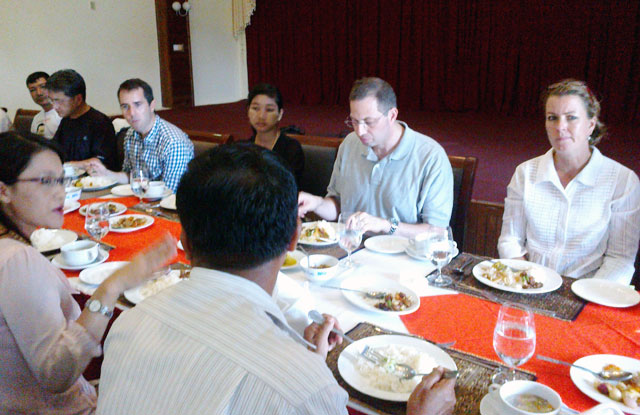The U.S. Deputy Assistant Secretary for East Asia and Pacific Affairs, Mr. Joseph Yun and his U.S. delegation have met regional officials as well as local Arakanese Buddhist monks, other religious leaders, politicians, students and other youth in the Capital Sittwe when they visited the region from the 8th to the 9th of September.
 The U.S. delegation investigated the violence which recently took place in Arakan State and also consulted locals in order to find ways to ensure future peace and stability in the region during their visit.
The U.S. delegation investigated the violence which recently took place in Arakan State and also consulted locals in order to find ways to ensure future peace and stability in the region during their visit.
Ven. U Aryar Wantha, the abbot of the Shwe Zaydi Monastery, and U San Kyaw Hla, a central committee member of the Rakhine Nationalities Development Party, were included among those who were met by the delegation in Sittwe.
Ven. U Aryar Wantha said he was met by the delegates on the 8th of September in his monastery and was asked about his opinions on the violence.
“They were three people, including American Deputy Foreign Secretary Mr. Joseph Yun and Ambassador Mr. Derek Mitchell who came and met me. We discussed mainly matters of stability and rehabilitation in the aftermath of violence in Arakan State during our meeting”, said U Aryar Wantha.
The monk said that he told the U.S. delegates that the international allegations that Arakanese are violating the rights of Bengali immigrants and settlers in Arakan State are untrue.
“When talking about the violence, I told them that the international allegations that Arakanese have threatened and killed Bengalis are totally baseless and untrue. The Arakanese are Buddhists who have loving kindness for all living beings and have been living with peoples of other religions and races hand in hand and peacefully. The problem that occurred is because of the Bengalis who are trying to take the lands of Arakan. I explained to them that these Bengali people have created such problems six times already since 1942.”
Moreover the monk said, “If we have to question international laws and standards about peace, then there are laws in the USA for deciding citizenship for Spanish and Mexican people who flee. There are likewise so many Burmese peoples in Thailand, who left their homeland for various reasons, but they are never granted citizenship and are being confined to refugee camps. Regarding the Bengalis who are here, we have to consider them in two different categories—the Bengalis who are acceptable as citizens should be allowed to live in their properties in our Arakan State, but the ones who do not meet the standards of a citizen should be kept in camps that will be systematically controlled by the government and the UN’s refugee agency. The problem will become more complicated if they are allowed to live in Arakan State without that identification. I explained this matter to the U.S. delegates as well.”
The U.S. Deputy Secretary is said to have made responses to the monk’s explanation during the meeting as well.
“They appreciated our explanation about the root causes of the conflict and the comparison with the international laws and standards as solutions for finding ways for peace in our region. They also told us that they would pay special consideration to our proposals and explanations about the problems in our homeland”, said the monk.
When asked about his discussion with the U.S. delegates, U Kyaw San Hla, the central committee member of the RNDP, said, “They discussed with us especially about how this problem occurred and what we could do for the peace between both sides. We have told them that the Bengali Muslims now desire official ethnic status as Rohingya in our homeland and also want some part of our Arakan Land as an autonomous region. We explained them that those are the main reasons behind the recent violence in our region. No Arakanese will ever agree to their status as Rohingya and a separate land in our region. But it is an inappropriate time for me to explain to you what we have told them, in order to safeguard future and sustainable peace in our region.”
He said U Khin Maung Gyi and U Oo Shwe Maung who are also central committee members of the RNDP were included in the meeting with the U.S officials.



